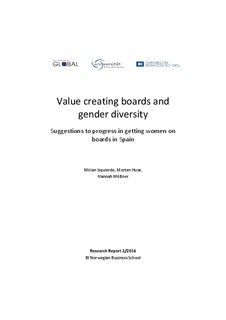| dc.description.abstract | Spain was one of the first countries in Europe to set out a gender balance legislation on corporate board by the organic law 3/2007 of 22nd of March. However, the recommendation included in the law for big companies to attain a 40% of the least represented gender by 2015, did not contain any sanctioning. As a consequence Spain is at present among the large European countries with the lowest percentage of women on boards. In this report we make suggestions about how to get progress in getting women on boards in Spain.
We report the results of an empirical study that took place in Spain from the fall 2015 and to the spring 2016. Methods used were direct observations, interviews and a questionnaire survey. Observations from other countries and earlier research were inputs to the various studies. These observations are also presented in this report.
Based on the wider results of the survey, the debates in the organized panels, the interviews, the slow motion of the voluntary approach, the needs of the Spanish business society to reflect the social and consumer reality, the need of credibility, reliability, corporate governance recommendations and competitiveness, we conclude that:
1) Quotas are faster and easier than just informal pressure. A flexible approach could be pursued, but a quota threat should be built in, in order to obtain results. For leading the change a concrete strategy led by a political structure, with the eventual help of an ad-hoc committee or body, should be temporarily created, in case the quota approach is not retained.
2) The business community needs to open its eyes and be aligned in seeing the advantages for getting women on boards from a wide and diverse talent pool, reflecting the social reality on today´s boards.
3) There is a need for coordinated efforts of different stakeholders to achieve and follow up developments. This cannot be done through existing women organizations, but through cooperation between politicians, businesses and leaders (men and women).
4) The motions for promoting women on boards should be supported by developing value creating boards and focused training for board members. | nb_NO |
